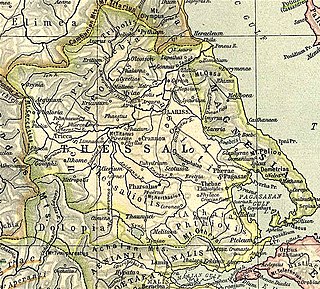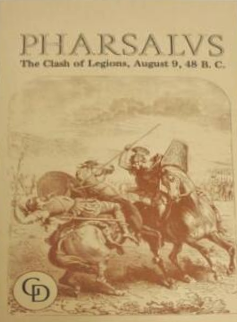Pharsalus may refer to:
- Pharsalus (planthopper), a genus of insects in the family Ricaniidae
- Farsala, a city in Greece, known in antiquity as Pharsalos
- Battle of Pharsalus (disambiguation)
Pharsalus may refer to:

The Battle of Pharsalus was the decisive battle of Caesar's Civil War fought on 9 August 48 BC near Pharsalus in Central Greece. Julius Caesar and his allies formed up opposite the army of the Roman Republic under the command of Pompey. Pompey had the backing of a majority of Roman senators and his army significantly outnumbered the veteran Caesarian legions.
English usually refers to:
Null may refer to:
Enipeus, in ancient Greece, was a river god. Enipeus was loved by a mortal woman named Tyro, who was married to a mortal man named Cretheus. Poseidon, filled with lust for Tyro, disguised himself as Enipeus and from their union was born Pelias and Neleus, twin boys. The River Enipeus is located in Thessaly, and was the site of the Battle of Cynoscephalae and the Battle of Pharsalus.
Category, plural categories, may refer to:
In Greek mythology Phthia was a city or district in ancient Thessaly. It is frequently mentioned in Homer's Iliad as the home of the Myrmidons, the contingent led by Achilles in the Trojan War. It was founded by Aeacus, grandfather of Achilles, and was the home of Achilles' father Peleus, mother Thetis, and son Neoptolemus.

Farsala, known in Antiquity as Pharsalos, is a city in southern Thessaly, in Greece. Farsala is located in the southern part of Larissa regional unit, and is one of its largest towns. Farsala is an economic and agricultural centre of the region. Cotton and livestock are the main agricultural products, and many inhabitants are employed in the production of textile. The area is mostly famous for being the birthplace of the mythical ancient Greek hero Achilles, and the site of a major battle between Roman generals Gaius Julius Caesar and Gnaeus Pompeius Magnus in 48 BC.
Pharsalus repandus is a species of planthopper insects described by Leopold Melichar in 1906. It is the sole member of Pharsalus, the type genus of the subfamily Pharsalinae of the family Ricaniidae.
Menon of Pharsalus may refer to:
Polydamas or Poludamas, feminine Polydama or Polydamna, may refer to:
Palaepharsalus or Palaipharsalos was a town of ancient Thessaly, from which the town moved to the later location of Pharsalus.
Sisyphus was the king of Corinth, punished in Tartarus by being cursed to roll a huge boulder up a hill in Greek mythology.
Menon may refer to:
Polymas of Thessaly may refer to:

Thessaly or Thessalia was one of the traditional regions of Ancient Greece. During the Mycenaean period, Thessaly was known as Aeolia, a name that continued to be used for one of the major tribes of Greece, the Aeolians, and their dialect of Greek, Aeolic.

The Battle of Pharsalus was fought in late 1277 at the plain of Pharsalus in Thessaly between an invading Byzantine army led by the megas stratopedarches John Synadenos and megas konostaulos Michael Kaballarios, and the forces of John I Doukas, ruler of Thessaly. This was the first major Byzantine campaign against Thessaly after the failure of the previous expedition at the Battle of Neopatras. The battle resulted in a crushing victory for John Doukas: Synadenos was captured, while Kaballarios died shortly afterwards of his wounds.
The Battle of Pharsalus was a decisive battle of the Roman civil wars, fought in 48 BC between Julius Caesar and Pompey.

Acraea pharsalus, the east African forest acraea or Pharsalus acraea, is a butterfly in the family Nymphalidae which is native to the tropics and subtropics of Africa.
Undefined may refer to:

Pharsalus: The Clash of Legions, August 9, 48 B.C. is a board wargame published by Game Designers' Workshop (GDW) in 1977 that simulates the Battle of Pharsalus, which decided who would rule the Roman Empire, Pompey or Julius Caesar.